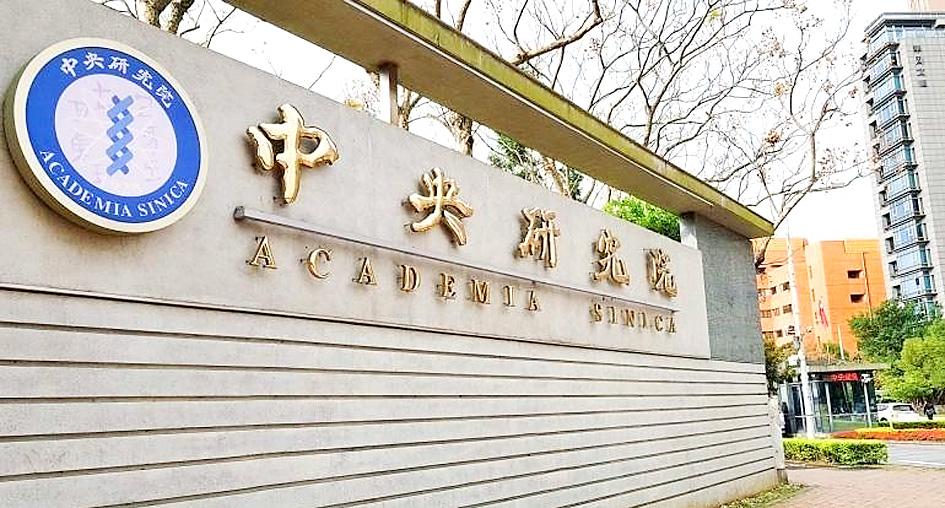Academia Sinica members are concerned the institution’s widely used Latin name might cause foreign researchers to mistakenly assume it is based in China, and it is deliberating a new name.
The institution plans to raise the issue at the legislature today, sources said, adding that Democratic Progressive Party Legislator Fan Yun (范雲) had also brought the issue up with Academia Sinica President James Liao (廖俊智) during a meeting of the legislature’s Education and Culture Committee in March last year.
Academia Sinica has sometimes been confused with the Chinese Academy of Sciences, as its Latin name translates to “Chinese Academy” in English, Fan said at the time.

Photo: Yang Yuan-ting, Taipei Times
Liao promised to ensure that Academia Sinica members discuss a name change, and has since formed an ad hoc committee for that purpose, which has met four times.
The committee in August drafted a report on proposed names, which was sent to researchers at the institution to discuss, sources said.
One proposal was to add the word “Taiwan” to the end of the existing name, so it would be titled “Academia Sinica, Taiwan.” Another was a direct translation of the institution’s Chinese name, making it the “Central Research Academy,” while other proposals were the “Taiwan Academy of Sciences” or the “Academy of Sciences Taiwan.”
In its report, the committee confirmed that confusion had been caused by the institution’s name, but said that there were some benefits to leaving it unchanged.
For example, the name is already associated with scientific achievements, so keeping it would ensure Taiwan’s reputation remains stable within the international academic community, whereas changing it would come with associated costs, the report said.
Changing it might also result in difficulties when cooperating with Chinese researchers, it said.
However, changing it would ensure that Taiwan receives credit for its outstanding research, the report said, adding that the committee found that most people asked about the proposals were in favor of adding “Taiwan” to the end of the name.
Fan on Saturday commended the institution for its progress on the matter, and said she welcomed further deliberation by all Academia Sinica members and researchers.

MAKING WAVES: China’s maritime militia could become a nontraditional threat in war, clogging up shipping lanes to prevent US or Japanese intervention, a report said About 1,900 Chinese ships flying flags of convenience and fishing vessels that participated in China’s military exercises around Taiwan last month and in January have been listed for monitoring, Coast Guard Administration (CGA) Deputy Director-General Hsieh Ching-chin (謝慶欽) said yesterday. Following amendments to the Commercial Port Act (商港法) and the Law of Ships (船舶法) last month, the CGA can designate possible berthing areas or deny ports of call for vessels suspected of loitering around areas where undersea cables can be accessed, Oceans Affairs Council Minister Kuan Bi-ling (管碧玲) said. The list of suspected ships, originally 300, had risen to about 1,900 as

Japan’s strategic alliance with the US would collapse if Tokyo were to turn away from a conflict in Taiwan, Japanese Prime Minister Sanae Takaichi said yesterday, but distanced herself from previous comments that suggested a possible military response in such an event. Takaichi expressed her latest views on a nationally broadcast TV program late on Monday, where an opposition party leader criticized her for igniting tensions with China with the earlier remarks. Ties between Japan and China have sunk to the worst level in years after Takaichi said in November that a hypothetical Chinese attack on Taiwan could bring about a Japanese

MORE RESPONSIBILITY: Draftees would be expected to fight alongside professional soldiers, likely requiring the transformation of some training brigades into combat units The armed forces are to start incorporating new conscripts into combined arms brigades this year to enhance combat readiness, the Executive Yuan’s latest policy report said. The new policy would affect Taiwanese men entering the military for their compulsory service, which was extended to one year under reforms by then-president Tsai Ing-wen (蔡英文) in 2022. The conscripts would be trained to operate machine guns, uncrewed aerial vehicles, anti-tank guided missile launchers and Stinger air defense systems, the report said, adding that the basic training would be lengthened to eight weeks. After basic training, conscripts would be sorted into infantry battalions that would take

Right-wing political scientist Laura Fernandez on Sunday won Costa Rica’s presidential election by a landslide, after promising to crack down on rising violence linked to the cocaine trade. Fernandez’s nearest rival, economist Alvaro Ramos, conceded defeat as results showed the ruling party far exceeding the threshold of 40 percent needed to avoid a runoff. With 94 percent of polling stations counted, the political heir of outgoing Costa Rican President Rodrigo Chaves had captured 48.3 percent of the vote compared with Ramos’ 33.4 percent, the Supreme Electoral Tribunal said. As soon as the first results were announced, members of Fernandez’s Sovereign People’s Party